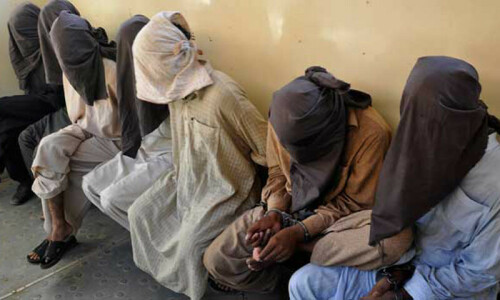ISLAMABAD, June 10: Pakistan’s tax revenue to GDP ratio stood at only 10 per cent during 2007-08 compared to an average of 18 per cent for other developing countries, says Economic Survey 2007-08.
This indicates that substantial tax policy measures are still needed to broaden the tax base. The buoyancy and elasticity of the taxation system does not exhibit the desired improvements and needs to be focused on.
According to the survey, the country’s tax regime resembles the one generally practised throughout Latin American countries, where indirect taxes, in particular the sales tax, occupy a relatively high share within the overall tax revenue.
This dismal performance of the Pakistan’s tax machinery occurred despite the fact that the World Bank has given $150 million loans for refurbishing of new buildings, purchase of new cars and increasing salaries of the tax officials.
The indirect tax to GDP ratio stood at around 6 per cent and direct tax to GDP ratio stood at around 4 per cent and less than 2 per cent if withholding taxes are excluded.
The government recognises the need to broaden the tax base and reduce marginal tax rates, which would stimulate investment and production.
Broadening of tax base will also ensure the fair distribution of the tax burden among various sectors of the economy. The overall services sector including wholesale and retail trade as well as agriculture are potential candidates for broadening of the tax bases.
The revenue target for the current fiscal year is expected to reach one trillion rupees as against the original target of Rs1,025 billion.
According to the survey, due to a number of wide-ranging exemptions and concessions as well as rampant tax evasion, the tax base is narrow and punctured. Secondly, the tax rates have been pitched at high levels, which created as vicious cycle of tax base erosion and higher tax rates.
The revenue loss to the national exchequer because of major tax exemptions declined by 51.2 per cent to Rs89.52 billion in 2007-08 against Rs183.69 billion over the corresponding year.
Of these, 77.3 per cent decline was recorded in income tax exemptions, which fell from Rs121.88 billion in 2006-07 to Rs27.66 billion in 2007-08. However, this major decline was due to the exemptions of capital gains tax on stockbrokers, which declined to Rs18.48 billion in 2007-08 from Rs112.45 billion in the previous year.
A decrease of 11 per cent in customs exemption has been witnessed during the current fiscal year to Rs44.26 billion against Rs49.81 billion in the previous year. However, the sales tax exemptions edged up to Rs17.6 billion in 2007-08 from Rs12 billion in the previous year. The major portion of sales tax exemption was due to relief on pharmaceuticals.












































Dear visitor, the comments section is undergoing an overhaul and will return soon.